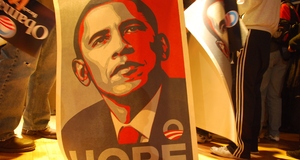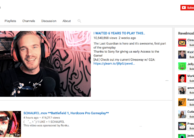Featured Article:Ronald Reagan's Presidential Radio Addresses: Themes of Unity
By
2013, Vol. 5 No. 04 | pg. 6/6 | « While Reagan clearly idolized Franklin D. Roosevelt, he also addressed other famous Presidents. When explaining the upcoming budget for 1984, he alluded to Lincoln when he said: “As Lincoln once said in another turbulent time, "If we do not make common cause to save the good old ship of the Union on this voyage, nobody will have a chance to pilot her on another voyage.” Well, America met her test then. With your help, we'll do it again” (Reagan, 1984). Without a doubt, Lincoln is one of the most famous U.S. Presidents because he called for America to unite amid the violent divisions caused by the Civil War. Millions of listeners would likely feel proud to be American because Reagan evoked Lincoln’s name. In a similar manner, it was no accident that Lincoln and Reagan were both Republicans. Observant listeners would likely notice that he was strengthening partisan identity. Like previous addresses, two techniques were used here. First, when reading aloud the letter from the Massachusetts school children, Reagan quotes directly and then offers his own brief commentary afterwards. Second, he ties it into an overall theme. In this case, the theme was persistence, which he accomplished by mentioning the success of the 1983 budget. With a financial victory under America’s belt, Reagan hoped to lead America on the same path to success. Likewise, Reagan was almost certainly inspired by Roosevelt’s allusions to great American political leaders of the past. Roosevelt effectively alluded to George Washington’s birthday a day after the occasion in 1942 when he remarked: “My fellow Americans: Washington's Birthday is a most appropriate occasion for us to talk with each other about things as they are today and things as we know they shall be in the future. For eight years, General Washington and his Continental Army were faced continually with formidable odds and recurring defeats. Supplies and equipment were lacking. In a sense, every winter was a Valley Forge. Throughout the 13 states there existed fifth columnists – and selfish men, jealous men, fearful men, who proclaimed that Washington's cause was hopeless, and that he should ask for a negotiated peace. Washington’s conduct in those hard times has provided the model for all Americans ever since – a model of moral stamina” (Reagan, 1982).An effective speaker must keep in mind that, in order to tie an allusion into the main theme of a speech, timing is key. In this case, Roosevelt strategically used the occasion of George Washington’s birthday. Moving deeper, since he promoted persistence and patriotism during adversity, he felt that these traits were needed during the Great Depression. Interestingly, Reagan did not always quote Presidents who were affiliated with the Republican Party. While he unsurprisingly mentioned Franklin D. Roosevelt in many radio talks, he also mentioned Democratic Presidents. In an address from April 1983, he spoke about Democratic President John F. Kennedy. Clearly, had Kennedy not been assassinated in November 1963, he would have had more time to implement new and potentially far-reaching policies. In this sense, Roosevelt’s legacy as a titan within the Democratic Party is nearly uncontested. Despite this, Reagan observed: “The liberal Democratic tax policy seems to boil down to this: America makes, Government takes. The fallacy of this approach was well understood by a visionary Democrat, President John F. Kennedy, who said in 1963, "The largest single barrier to full employment and to a higher rate of economic growth is the heavy drag of Federal income taxes on private purchasing power, initiative, and incentive.” His words are just as true today” (Reagan, 1983). While it may be easy to conclude that Reagan built bi-partisanship by referencing Kennedy, he was in fact accomplishing just the opposite. He spun Kennedy’s words around to point out the fallacies of the Democrats. In this sense, he accomplished many tasks: paying homage to Kennedy, defining the Democratic Party, giving a brief commentary and tying it into the 1980s society. Concluding ThoughtsIn many ways, Reagan was successful in crafting a favorable public image using the radio. He proved that he could capitalize on his strengths amidst extemporaneous weaknesses that were exploited by the media. Like Roosevelt’s Fireside Chats, Reagan’s Presidential Radio Addresses were inclusive and used several rhetorical techniques under a “feel good” demeanor. His most effective rhetorical devices used humor, analogies and allusions. When using any technique, he remained publicly transparent to reach out to Republicans and Democrats alike. Likewise, like any President, he was under the watchful eye of the nation. Thus, he would improve his chances of remaining popular among varying interests. When employing allusions, his main goal was to highlight common tenets of society to Patriotism. Whether using lines from the film Casablanca or a saying from President Kennedy, he wanted to use witty language to show his political agenda. Reagan’s showcased his humor because, as President, he could be lively despite handling the pressure of running America. As Columbia University Political Science Professor Richard Pious said, “[For Reagan], personalities became more important than issues; metaphor, analogy, and storytelling become more important than inconvenient facts; emotion displaced reason in political argumentation” (Rowland & Jones, 108). ReferencesAbbott, P. (1997). Leadership by Exemplar: Reagan’s FDR and Thatcher’s Churchill. Presidential Studies Quarterly 27 (2) ,186-206. Address to the nation on the explosion of the space shuttle challenger: January 28, 1986. In (1993). D. Houck & A. Kiewe (Eds.),Actor, Ideologue, Politician: The Public Speeches of Ronald Reagan(pp. 280-281). Westport, CT: Greenwood Press. The American Presidency Project. (2011). Presidential News Conferences Hoover - Obama. Retrieved from http://www.presidency.ucsb.edu/news_conferences.php?year=1981&Submit=DISPLAY Auer, J. J. (1992). Acting like a president; or, what has Ronald Reagan done to political speaking? In M. Weiler & W. Pearce (Eds.),Reagan and Public Discourse in AmericaTuscaloosa, AL: The University of Alabama Press. Blankenship, J. and Muir, J.K. The Transformation of Actor to Scene: Some Strategic Grounds of the Reagan Legacy. In M. Weiler & W. Pearce (Eds.),Reagan and Public Discourse in AmericaTuscaloosa, AL: The University of Alabama Press. Bostdorff, D.M. and Goldzwig, S.R. (2005). History, Collective Memory, and the Appropriation of Martin Luther King, Jr.: Reagan’s Rhetorical Legacy. Presidential Studies Quarterly 35 (4), 661-690. Bush, G.H.W. (1990). Radio Address to the People of Czechoslovakia November 17, 1990. Retrieved from http://www.presidency.ucsb.edu/ws/index.php?pid=19068#ixzz1GMDk17o2. Cannon, L. (1991). President Reagan: The role of a lifetime. New York: Simon & Schuster. Edoardo, A.M., Fienberg S.E. and Skinner, K.K. (2007). Whose Ideas? Whose Words? Authorship of Ronald Reagan's Radio Addresses. PS: Political Science and Politics 40 (3), 501-506. Erickson, P.D. (1985) Reagan Speaks: The Making of an American Myth. New York: New York University Press. Internet Movie Database. (2011). Ronald Reagan (I) (1911–2004). Retrieved from http://www.imdb.com/name/nm0001654/#Actor. Lim, E.T. (2002). Five Trends in Presidential Rhetoric: An Analysis of Rhetoric from George Washington to Bill Clinton. Presidential Studies Quarterly 32 (2), 328-366. Locander, R. (1983). Modern Presidential In-Office Communications: The National, Direct, Local and Latent Strategies. Presidential Studies Quarterly 13 (2), 242-254. NOAA. (2010). Mid Atlantic Winters: Snow, Wind, Ice and Cold. Retrieved from http://www.erh.noaa.gov/lwx/winter/DC-Winters.htm. Reagan, R. (1982). Christmas Day Radio Address to the Nation December 25, 1982. Retrieved from http://www.presidency.ucsb.edu/ws/index.php?pid=42147#axzz1G3X83RAa. Reagan, R. (1980). Election Eve Address "A Vision for America" November 3, 1980. Retrieved from http://www.presidency.ucsb.edu/ws/index.php?pid=85199. Reagan, R. (1989). Farewell Address (January 11, 1989) Ronald Wilson Reagan. Retrieved from http://millercenter.org/scripps/archive/speeches/detail/3418. Reagan, R. (1984). Radio Address to the Nation on Administration Policies August 25, 1984. Retrieved from http://www.presidency.ucsb.edu/ws/index.php?pid=40297#ixzz1GDoDNcNB. Reagan, R. (1982). Radio Address to the Nation on Agriculture and Grain Exports October 15, 1982. Retrieved from http://www.presidency.ucsb.edu/ws/index.php?pid=41871. Reagan, R. (1983). Radio Address to the Nation on the American Family December 3, 1983. Retrieved from http://www.presidency.ucsb.edu/ws/index.php?pid=40829#ixzz1G8xkRMWx Reagan, R. (1985). Radio Address to the Nation on the American National Red Cross November 16, 1985. Retrieved from http://www.presidency.ucsb.edu/ws/index.php?pid=38084#axzz1G3X83RAa. Reagan, R. (1983). Radio Address to the Nation on the Anniversary of the Birth of Martin Luther King, Jr. January 15, 1983. Retrieved from http://www.presidency.ucsb.edu/ws/index.php?pid=41387#axzz1G3X83RAa. Reagan, R. (1982). Radio Address to the Nation on Armed Forces Day May 15, 1982. Retrieved from http://www.presidency.ucsb.edu/ws/index.php?pid=42525. Reagan, R. (1988). Radio Address to the Nation on Armed Forces Day May 21, 1988. Retrieved from http://www.presidency.ucsb.edu/ws/index.php?pid=35862#ixzz1GM8QdQEM. Reagan, R. (1987). Radio Address to the Nation on Budget Reform June 20, 1987. Retrieved from http://www.presidency.ucsb.edu/ws/index.php?pid=34457#ixzz1GL7gbloV. Reagan, R. (1982). Radio Address to the Nation on the Caribbean Basin Initiative and Student Loans April 10, 1982. Retrieved from http://www.presidency.ucsb.edu/ws/index.php?pid=42382. Reagan, R. (1985). Radio Address to the Nation on Civil Rights June 15, 1985. Retrieved from http://www.presidency.ucsb.edu/ws/index.php?pid=38782#ixzz1GE4jroep Reagan, R. (1982). Radio Address to the Nation on the Congressional Agenda and the Economy November 6, 1982. Retrieved from http://www.presidency.ucsb.edu/ws/index.php?pid=41959. Reagan, R. (1983). Radio Address to the Nation on Defense Spending February 19, 1983. Retrieved from http://www.presidency.ucsb.edu/ws/index.php?pid=40950#axzz1G3X83RAa. Reagan, R. (1987). Radio Address to the Nation on Deficit Reduction March 28, 1987. Retrieved from http://www.presidency.ucsb.edu/ws/index.php?pid=34034#ixzz1GL5oj2gr. Reagan, R. (1984). Radio Address to the Nation on Deficit Reduction and Taxation August 4, 1984. Retrieved from http://www.presidency.ucsb.edu/ws/index.php?pid=40233#ixzz1GALKs4i0. Reagan, R. (1983). Radio Address to the Nation on Domestic Social Issues January 22, 1983. Retrieved from http://www.presidency.ucsb.edu/ws/index.php?pid=41643 Reagan, R. (1984). Radio Address to the Nation on Drug Abuse October 6, 1984. Retrieved from http://www.presidency.ucsb.edu/ws/index.php?pid=39198#ixzz1GDr2NfTc. Reagan, R. (1982). Radio Address to the Nation on Economic and Budget Issues October 23, 1982. Retrieved from http://www.presidency.ucsb.edu/ws/index.php?pid=41908. Reagan, R. (1985). Radio Address to the Nation on Economic Growth February 9, 1985. Retrieved from http://www.presidency.ucsb.edu/ws/index.php?pid=38202#ixzz1GE29aNin. Reagan, R. (1985). Radio Address to the Nation on Economic Growth January 26, 1985. Retrieved from http://www.presidency.ucsb.edu/ws/index.php?pid=38899#ixzz1GE1KcL00. Reagan, R. (1985). Radio Address to the Nation on Economic Growth and Minorities July 27, 1985. Retrieved from http://www.presidency.ucsb.edu/ws/index.php?pid=38939. Reagan, R. (1985). Radio Address to the Nation on Economic Growth and Tax Reform August 3, 1985. Retrieved from http://www.presidency.ucsb.edu/ws/index.php?pid=38971#ixzz1GE6MPr5K. Reagan, R. (1983). Radio Address to the Nation on the Economic Recovery Program February 5, 1983. Retrieved from http://www.presidency.ucsb.edu/ws/index.php?pid=40817#axzz1G3X83RAa. Reagan, R. (1984). Radio Address to the Nation on the Economic Recovery Program January 21, 1984. Retrieved from http://www.presidency.ucsb.edu/ws/index.php?pid=41643. Reagan, R. (1984). Radio Address to the Nation on the Economic Recovery Program and on Tax Reductions April 21, 1984. Retrieved from http://www.presidency.ucsb.edu/ws/index.php?pid=39711#ixzz1G93EJ0kg. Reagan, R. (1982). Radio Address to the Nation on the Economy August 28, 1982. Retrieved from http://www.presidency.ucsb.edu/ws/index.php?pid=42900. Reagan, R. (1984). Radio Address to the Nation on the Economy June 23, 1984. Retrieved from http://www.presidency.ucsb.edu/ws/index.php?pid=40090#axzz1G3X83RAa. Reagan, R. (1982). Radio Address to the Nation on the Economy October 16, 1982. Retrieved from http://www.presidency.ucsb.edu/ws/index.php?pid=41876. Reagan, R. (1988). Radio Address to the Nation on the Economy October 22, 1988. Retrieved from http://www.presidency.ucsb.edu/ws/index.php?pid=35051#ixzz1GMBG5JvW. Reagan, R. (1984). Radio Address to the Nation on the Economy and on National Defense May 26, 1984. Retrieved from http://www.presidency.ucsb.edu/ws/index.php?pid=39974#ixzz1G96PAoTa. Reagan, R. (1983). Radio Address to the Nation on Education April 30, 1983. Retrieved from http://www.presidency.ucsb.edu/ws/index.php?pid=41259#ixzz1G8KD899C. Reagan, R. (1984). Radio Address to the Nation on Education September 8, 1984. Retrieved from http://www.presidency.ucsb.edu/ws/index.php?pid=40345#ixzz1GDpbvMEF. Reagan, R. (1983). Radio Address to the Nation on Employment Programs March 5, 1983. Retrieved from http://www.presidency.ucsb.edu/ws/index.php?pid=41003. Reagan, R. (1986). Radio Address to the Nation on the Federal Budget February 1, 1986. Retrieved from http://www.presidency.ucsb.edu/ws/index.php?pid=36446#ixzz1GEmiEdXi. Reagan, R. (1982). Radio Address to the Nation on Federal Budget Legislation and Unemployment Figures May 8, 1982. Retrieved from http://www.presidency.ucsb.edu/ws/index.php?pid=42499. Reagan, R. (1982). Radio Address to the Nation on the Federal Budget and the Western Alliance May 29, 1982. Retrieved from http://www.presidency.ucsb.edu/ws/index.php?pid=42584. Reagan, R. (1983). Ronald Reagan: Radio Address to the Nation on Federal Income Taxes April 9, 1983. Retrieved from http://www.presidency.ucsb.edu/ws/index.php?pid=41164#ixzz1G7z4xRCa. Reagan, R. (1983). Radio Address to the Nation on the Federal Reserve Board Chairman, the Seventh Space Shuttle Flight, and Science Education June 18, 1983. Retrieved from http://www.presidency.ucsb.edu/ws/index.php?pid=41495#ixzz1G8M9SDKr. Reagan, R. (1983). Radio Address to the Nation on the First Session of the 98th Congress November 19, 1983. Retrieved from http://www.presidency.ucsb.edu/ws/index.php?pid=40795#ixzz1G8ww0rCZ. Reagan, R. (1983). Radio Address to the Nation on the Fiscal Year 1984 Budget February 12, 1983. Retrieved from http://www.presidency.ucsb.edu/ws/index.php?pid=40925#axzz1G3X83RAa. Reagan, R. (1983). Radio Address to the Nation on the Fiscal Year 1984 Budget February 12, 1983. Retrieved from http://www.presidency.ucsb.edu/ws/index.php?pid=40925#axzz1G3X83RAa. Reagan, R. (1983). Radio Address to the Nation on the Fiscal Year 1984 Budget January 29, 1983. Retrieved from http://www.presidency.ucsb.edu/ws/index.php?pid=40517#axzz1G3X83RAa. Reagan, R. (1987). Radio Address to the Nation on the Fiscal Year 1988 Budget January 10, 1987. Retrieved from http://www.presidency.ucsb.edu/ws/index.php?pid=33875#ixzz1GL2Ywd3R. Suggested Reading from Inquiries Journal
Inquiries Journal provides undergraduate and graduate students around the world a platform for the wide dissemination of academic work over a range of core disciplines. Representing the work of students from hundreds of institutions around the globe, Inquiries Journal's large database of academic articles is completely free. Learn more | Blog | Submit Latest in Business & Communications |














